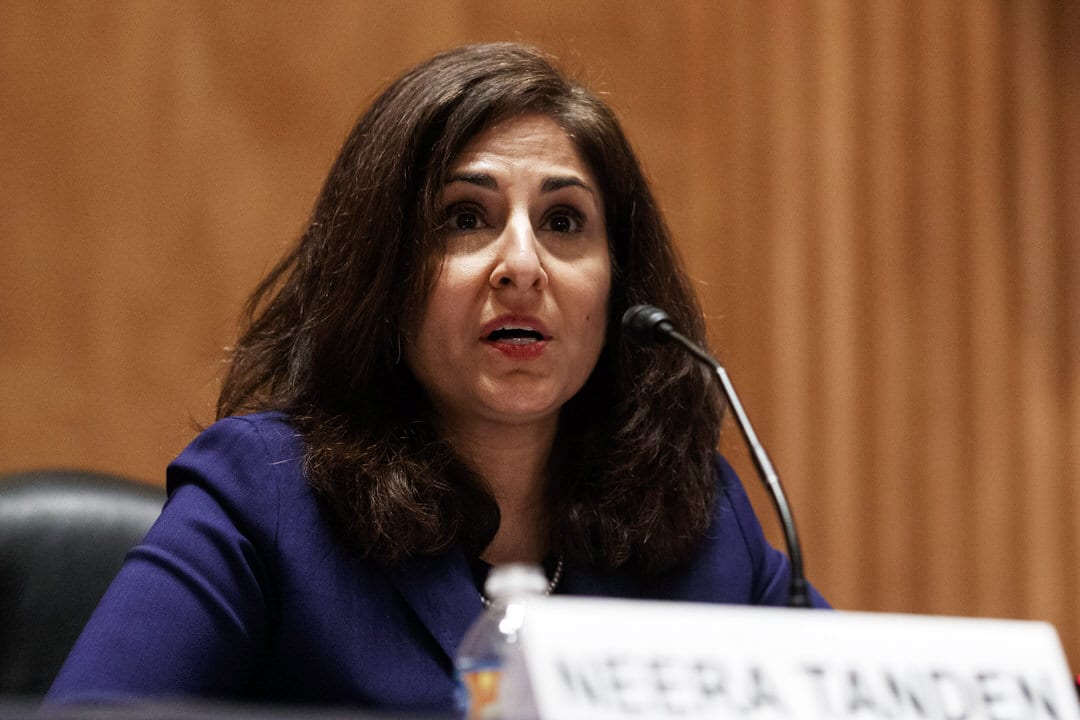Neera Tanden, President Joe Biden’s nominee to head the Office of Management and Budget, faced two tough days of questioning by senators who wondered whether Tanden’s prior incendiary remarks about members of Congress from both parties made her a poor fit for an influential position in the administration.
Tanden, the current president of the Center for American Progress (CAP), a progressive think tank, would be the first woman of color and first South Asian American to serve as director of the OMB, if confirmed. But she faces more opposition than most of Biden’s nominees at least in part because her nomination shocked Republicans.
Several Republicans said they thought Tanden’s language on Twitter, in particular, made her incapable of being a good faith, bipartisan negotiator. In her remarks Tuesday before the Senate Committee of Homeland Security and Governmental Affairs, Tanden said she recognized that her prior role as a liberal advocate allowed for a different tone than the one she’d hope to set as a member of the administration.
Sen. Rob Portman, an Ohio Republican, listed out specific disparaging tweets Tanden wrote about Republican senators during that hearing. Portman served as OMB director in the George W. Bush administration.
“You wrote that Susan Collins is ‘the worst.’ Tom Cotton is a fraud. That vampires have more heart than Ted Cruz. You called Leader McConnell ‘Moscow Mitch’ and ‘Voldemort,’” said Portman, who also questioned Tanden on deleting more than 1,000 pointed tweets in November shortly after the election. “How do you plan to mend fences and build relationships with members of Congress you have attacked through your public statements?”
Tanden apologized several times during the hearings for her prior tweets, saying she “deeply regrets” her language. It’s why she deleted tweets in the past few months, she said, adding that no one from the administration advised her to do so.
“I recognize that this role is a bipartisan role, and I know I have to earn the trust of senators across the board. I will work very aggressively to meet that concern,” Tanden said. “…For those concerned about my rhetoric and my language: I’m sorry, and I’m sorry for any hurt that they’ve caused.”
The discourse over Tanden’s past language, which spanned both days of hearings, was also linked to the reality that many Republicans did not condemn former President Donald Trump for his use of divisive language on social media platforms, including against members of his own party.
Michigan Sen. Debbie Stabenow addressed that duality: “We’ve endured years of mean tweets, I know we are all thinking that,” she said. On the concern from senators over Tanden’s language, Stabenow added that she wished “we had seen those comments consistently over the last four years.”
But Tanden also has a long, bitter history with progressives, and particularly Sen. Bernie Sanders, the chairman of the Budget Committee that Tanden faced Wednesday.
At the hearing Wednesday, Sanders opened by advocating for civil discourse and admonishing Tanden for her prior conflicts with Republicans and Democrats — “me personally,” he said.
“You come before this committee to assume a very important role in the United States government at a time when we need serious work on serious issues and not personal attacks on anybody whether they’re on the left or the right,” Sanders said.
“Social media does lead to too many personal comments and my approach will be radically different,” Tanden said.
Sanders is expected to support her nomination.
In terms of policy, Tanden’s perspective will in part be shaped by her background as the daughter of an Indian immigrant, she said. As OMB director, she would be tasked with leading an office that will implement Biden’s budget and policy agenda across government agencies, as well as oversee regulatory policy that can dip into a number of fields, including cyber security, climate change and domestic job growth.
Tanden said she has personally been impacted by the decisions OMB has made in the past. Her mother, Maya, who joined her at the Tuesday hearing, left India following a divorce and relied on food stamps and Section 8 housing to make ends meet for her two children.
“I remember being the only kid in the cafeteria line who used 10-cent vouchers from the Free Lunch Program. I remember using food stamps at the grocery store,” Tanden said Tuesday. “As I sit before this committee, I’m mindful that my path in life would never have been possible without budgetary choices that reflected our nation’s values — many of them made in the very agency I am now nominated to lead. That recognition and gratitude has been the north star of my career.”
Inequality, therefore, was centered in much of Tanden’s policy discussions over two days of questioning.
“I would note that, as we experience the deep economic challenges we’re facing, women are disproportionately being impacted by that. The recession is having a disproportionate impact on caregiving, and women are leaving because they need to take care of children who are not in school, amongst other reasons,” Tanden said.
She highlighted parts of Biden’s 10-year caregiving plan that includes expanding access to paid leave and creating universal, free pre-kindergarten for 3- and 4-year-olds, as well as an expanded child care tax credit.
Critically, Tanden said she thinks the investments on child care and working parents should not be just in response to the coronavirus pandemic, but long-term.
To pay for part of that, Biden and his team are facing opposition from Republicans and economists on the left about whether the $1.9 trillion price tag on his coronavirus relief package — one that will include an expansion of paid leave and emergency aid to the child care industry — is too high.
Former Treasury Secretary Larry Summers, who previously served as a senior fellow at CAP, has argued in a Washington Post editorial that the price tag is too big and too risky.
Asked about those comments Tuesday, and whether she will be able to provide accurate information on the distribution of funds in her role at the OMB, Tanden said, she “100 percent believes that it is critical for policymakers and the public to have information about … where their resources are going.”
Tanden also echoed statements made by other Biden Cabinet nominees for economic positions that it’s best to “act big” now that interest rates are low to prevent future scarring in the economy.
“We still have a lot of economic pain and in this moment we do have to ensure strong economic recovery which over the long run, would make us stronger,” she said. “It may put us in a better position to address deficit issues, but as a matter we should all be concerned about long-term fiscal sustainability.”
One of the most disputed parts of Biden’s plan is his inclusion of an increase in the minimum wage from $7.25 — a rate that has remained unchanged since 2009 — to $15 an hour by 2025. The policy would benefit 17 million workers whose wages will rise, but it will cost 1.4 million workers their jobs, according to an analysis by the nonpartisan Congressional Budget Office. Women, who make up two-thirds of the country’s 40 lowest-paid jobs, would be the most likely to be lifted out of poverty as a result, but also the most likely to be in jobs that may disappear.
That component of Biden’s proposal has faced stark opposition from Republicans. Tanden said Wednesday that she supports it.
Sen. Lindsey Graham, whose parents owned a restaurant-bar in South Carolina, got into a heated exchange with Tanden about her support of the measure, asking her if she “had ever run a restaurant.”
“You need to go talk to some people who have because it will give you some facts,” Graham said.
Tanden was also asked to defend how her past interactions with Wall Street as head of CAP will play out in a position where she’s implementing worker-focused policies put forth by the Biden administration. In her nine years at the think tank, Tanden heavily fundraised, bringing in at least $33 million between 2014 and 2019 from the financial sector. Sanders and Louisiana Sen. John Kennedy questioned those relationships.
“At the Center for American Progress, we proposed a financial transaction tax, we proposed higher regulations of Wall Street, we proposed dealing with carried interest … we proposed a whole series of policy proposals that would restrict the power of Wall Street,” Tanden said. “I believe Wall Street has too much power in our political discourse, and I have said that multiple times. I have said that in every role.”
Tanden’s nomination must next be approved by both Senate committees, Homeland Security and Governmental Affairs and Budget, before it can move to a vote by the full Senate.






